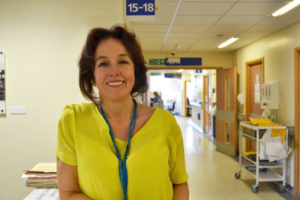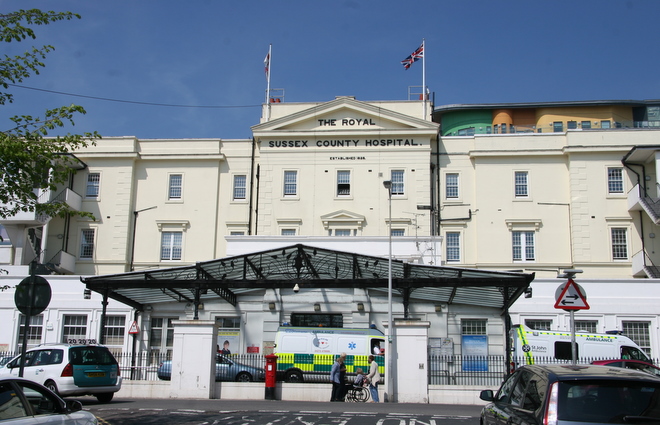Plans to close hospital wards and services, extend waiting times and stop some treatments are being considered by senior NHS officials, according to the Health Service Journal (HSJ).
They are exploring the plans as they look at ways to cut spending across the Sussex and Surrey area with a spending “cap” in prospect.
The “capped expenditure process” is being discussed privately between senior officials from NHS England and NHS Improvement and health managers in 14 areas of the country with the highest levels of overspending. Sussex and Surrey make up one of those areas.
HSJ said: “The principle of the process, introduced this year, is to ‘cap’ NHS spending in the targeted areas so that they meet ‘control total’ budgets in 2017-18.
“The programme comes amid the longest ever sustained squeeze on the NHS budget and with lower spending growth in 2017-18 than last year.
“These areas (14 including Surrey and Sussex) report gaps between plans and targets running into hundreds of millions of pounds but NHSE and NHSI have not made public the total national gap.”
Because Surrey and Sussex make up one of the NHS areas accused of overspending, it could face more ward closures, caps on operations, longer waiting times, reductions in medical treatments, a downgrading of services such as maternity and A&E, land sales and limits on prescriptions because of budget cuts.
Brighton and Sussex Universities NHS Trust was placed in special measures when it declared a financial deficit of £60 million last October and ended the 2016-17 financial year with a deficit of almost £70 million.
In late April 42 inspectors from the Care Quality Commission (CQC), the healthcare watchdog, spent three days at the trust.
Earlier in April Marianne Griffiths took charge of the trust along with a team from the neighbouring Western Sussex Hospitals.

She was chosen in part after overcoming the challenges involved in merging St Richard’s, in Chichester, with Worthing and Southlands to form the Western trust. She inherited a £21 million deficit but has managed to balance the books.
Western Sussex Hospitals is one of only five acute hospital trusts to be rated outstanding by the CQC and she was named chief executive of the year by the HSJ last year.
Mrs Griffiths said that she had agreed a breathing space with regulators and one monthly monitoring meeting to assess progress.
But added to the Brighton trust’s financial problems, the Liberal Democrats have warned that the NHS locally could lose up to 436 staff from the EU, including 61 doctors and 171 nurses, if Prime Minister Theresa May pushes on with a “hard Brexit”.
The figures are based on a survey for the Channel 4 current affairs programme Dispatches. It found that more than half of all doctors and 42 per cent of nurses from the EU are considering leaving because of Brexit.
The Lib Dems said that the Conservative approach to Brexit would lead to a £4.5 million bill to recruit local doctors and nurses and other support workers in the NHS from the EU after 2019.
Mrs May also plans to double the “immigration skills charge” to £2,000 a year for each doctor, nurse and health worker brought into the NHS or any other company from abroad by 2022.
Full figures on the number of EU nationals by local NHS trust and estimates of those considering leaving the UK because of Brexit can be found in the Channel 4 survey for Dispatches in March this year.
The Lib Dems have called for an immediate guarantee that all EU nationals in the UK, including those working in the NHS and social care, can stay after Brexit.
Emily Tester, the Lib Dem in Brighton Kemptown, said: “Hospitals in our city depend on doctors, nurses and other support staff from the EU. But many are now planning to leave because of the uncertainty caused by Brexit.
“We must guarantee their rights to stay here immediately to prevent a damaging exodus of these skilled and hard-working people. Our NHS, and the care we all rely on, would suffer without them.”
In the Lib Dem manifesto, the party said that it wanted an immediate guarantee of the rights of all EU nationals working in the NHS and social care and a penny on income tax for health and social care.
Labour said that it also believed that Britain should guarantee the rights of NHS staff from other EU countries and raise £30 billion for the health service by increasing income tax for the highest 5 per cent of taxpayers earning £80,000 or more per year.
The Conservatives have committed to a real terms increase of £8 billion in their manifesto in the next Parliament until 2022 which was the minimum expenditure recommended by the King’s Fund at the last 2015 election.
Like the Lib Dems, the Green Party wants to introduce an “NHS tax”, earmarked to increase direct funding of the NHS as part of general income and other taxation.
For more articles by Roz Scott, visit www.rozscott.com.










